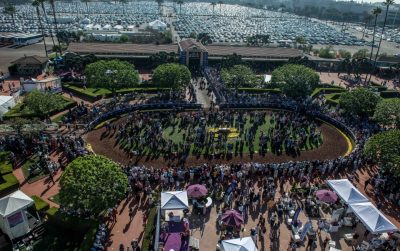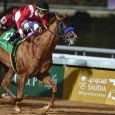By Ray Wallin

Santa Anita Park – US Racing Photo
As handicappers, we strive to be wrong less often than we are right. Yet in defeat we can find a positive.
Thinking back to the days of my misspent youth on the apron of the Monmouth Park grandstand with my late Uncle Dutch, I remember one regular handicapper who celebrated when he lost. You read that correctly, a handicapper that was thrilled when he lost a bet.
Stogie Steve looked like the guy who could be either your loving grandfather or a mafia hit man. He was a stocky guy with that leathery skin that came from spending too much time in the sun and from smoking too many cigars. Stogie Steve had a distinct gait after two knee replacement surgeries which gave him the appearance of waddling when he was briskly trying to make it to the windows to place his bets. He was about as tall as he was wide and always had a stogie clenched in his mouth. That stogie would start off unlit until about the third race and by the sixth it was down to a nub which he clamped his jaw down on until he was done for the day.
A guy like Stogie Steve could blend into the crowd full of retirees at the track during a weekday afternoon. One thing would make him stand apart from the crowd though. Win or lose he cheered and was excited at the end of every race.
The first time I met him I saw him cheering down by the rail. While my tickets were a bust in the opener that Wednesday afternoon at Monmouth Park, I figured he must have scored big. I made an off-the-cuff comment to my Uncle Dutch about him being such a “lucky bastard” to have nailed that race. Dutch laughed, crushed out his Marlboro Red, pounded the rest of his first can of Budweiser, and looked at me. “He lost that one, you know,” he said to me while wiping his mouth.
I stood confused while holding my losing tickets. I lost and I wasn’t happy. I was trying to figure out what I did wrong with my handicapping to miss that maiden taking the field wire to wire. Why was this guy still smiling after losing a race?
When Stogie Steve came back by our seats to grab a beer from Dutch’s cooler, I asked him why he was so happy about losing. As he ripped the pull tab off the can, he simply said, “I learned a lot from that race and that makes me happy.” Stogie Steve would go on to tell me how the trainer’s move of turning this horse back after letting him stretch out with showing early speed was what he thought could be a telltale sign that this trainer had a live horse running. “It confirmed my thinking kid, I didn’t play it, but was waiting to see if it would pan out.”
If you have read any of my other articles, you know I am a fan of doing post-mortems on my handicapping. I am a believer that you need to continue to challenge yourself and your handicapping to stay relevant in this game if you ever have any thoughts of making a living playing the races.
So, what did watching Stogie Steve’s positive reactions to losing wagers teach me?
#1 Accept defeat
No handicapper has ever won every bet they have placed. Even in my quest to find an automatic show bet, the best I could do is find something that hits 80% of the time for a modest profit. As handicappers we need to remember that it is the long-term, not the short-term, results that matter. We are going to have good days where we can’t lose if we tried, and days where we lose every photo or inquiry, and our horse looks like a pinball coming out of the gate.
Accept that sometimes we lose. Keep your emotions in check and get ready for the next opportunity. Accept defeat graciously and live to fight another day.
#2 Don’t deny it (unless you like digging)
No one wants to lose, but when you do, acknowledge that you lost. Understand why you lost. Was it your handicapping or a factor outside of your control? Did you miss the obvious early speed? Was your frontrunner slammed hard out of the gate and then forced five wide into the first turn? Would a good trip have brought you victory?
If you deny the facts of why you lost, you will continue to throw good money after bad. Your bankroll will quickly shrink, and you’ll be spending money you can’t afford to stay in the game. Accept defeat. Embrace that you lost and that you can find some useful piece of information from that loss. If your horse had a bad trip, make a note. Chances are that next time out the public will pass him over and you’ll get a good price on him off that troubled trip.
#3 Learn from it
Every handicapping book I have ever read, no matter how good or bad, has left me with at least one positive takeaway. It could be as simple as a new way to look at something. Losing a race is the same. Why did you lose? How and why did a horse under or over perform today? What does that tell you about that specific jockey or trainer? What would you do next time when you are presented with the same situation in terms of race conditions or pace scenario?
#4 Have the ability to detach
My old track buddy “The Trader” always bet Jersey Joe Bravo at Monmouth. He had a man-crush on Joe. He could tell you all the big bets he cashed thanks to “Joey B” and his great rides. This isn’t to say that I haven’t made a few bucks on Jersey Joe, but race-to-race I have to let go of what he has done for me in the past.
As handicappers, we can’t let our emotions get in the way. My favorite horse is Tiznow. I was at the Meadowlands alive in the Breeders’ Cup Pick 6 in 2000 when he had that amazing stretch drive against Giant’s Causeway. I loved him in his next start in the San Fernando Stakes in 2001 but went against him in the Strub Stakes in his next start.
While Tiznow had earned a place in my heart, as a handicapper I had to detach my emotions to play the race. I had to forget what he did for me in the past and focus on the vulnerability he had in the present.
#5 Avoid desirability bias
We all have a friend that bets something silly. My close friend Don Tot is one of those guys. He takes his craps and roulette more than seriously, but when it comes to the horses, he plays with his heart instead of his head. On Belmont Stakes Saturday in 2003, we were at Monmouth Park. Don Tot was intent on playing the Belmont Stakes despite only looking at the race briefly. Funny Cide was looking to capture the final leg of the Triple Crown. While I wanted to witness history, I had more knocks against the gelding than things I liked. I resigned myself to the fact that it was another “maybe next year” kind of Belmont Stakes.
Don Tot had other plans. “We are going to see history today, no other way about it,” he exclaimed as he ran off to place his bets. I looked at the past performances again to see if I had missed something. I had Funny Cide as a minor contender and was content to pass the race. Don Tot came back with a handful of tickets that cost him most of his bankroll.
As Empire Maker cruised home with the third-place Funny Cide about five lengths behind, I turned to Don Tot. His face said it all. “But I wanted him to win,” he muttered as he tore up his stack of losing tickets and threw them to the floor.
As handicappers we may want a specific outcome, but we need to look at the information provided to see if that desired outcome is likely or not. We can’t let our desires cloud our judgment. Because we want something to happen doesn’t mean our bankroll can will it to happen.
Find the positive in the negative and embrace defeat. Keep yourself detached from your emotions, what that horse has done for you in the past, and what you want to happen. If you do, you’ll continue losing your way to more profits.




